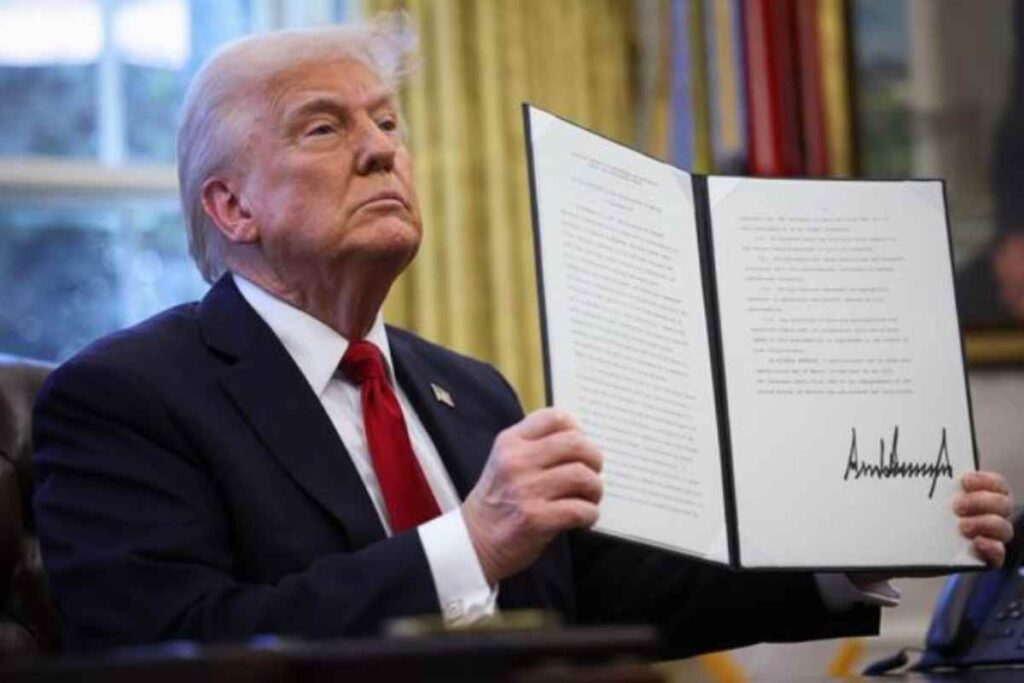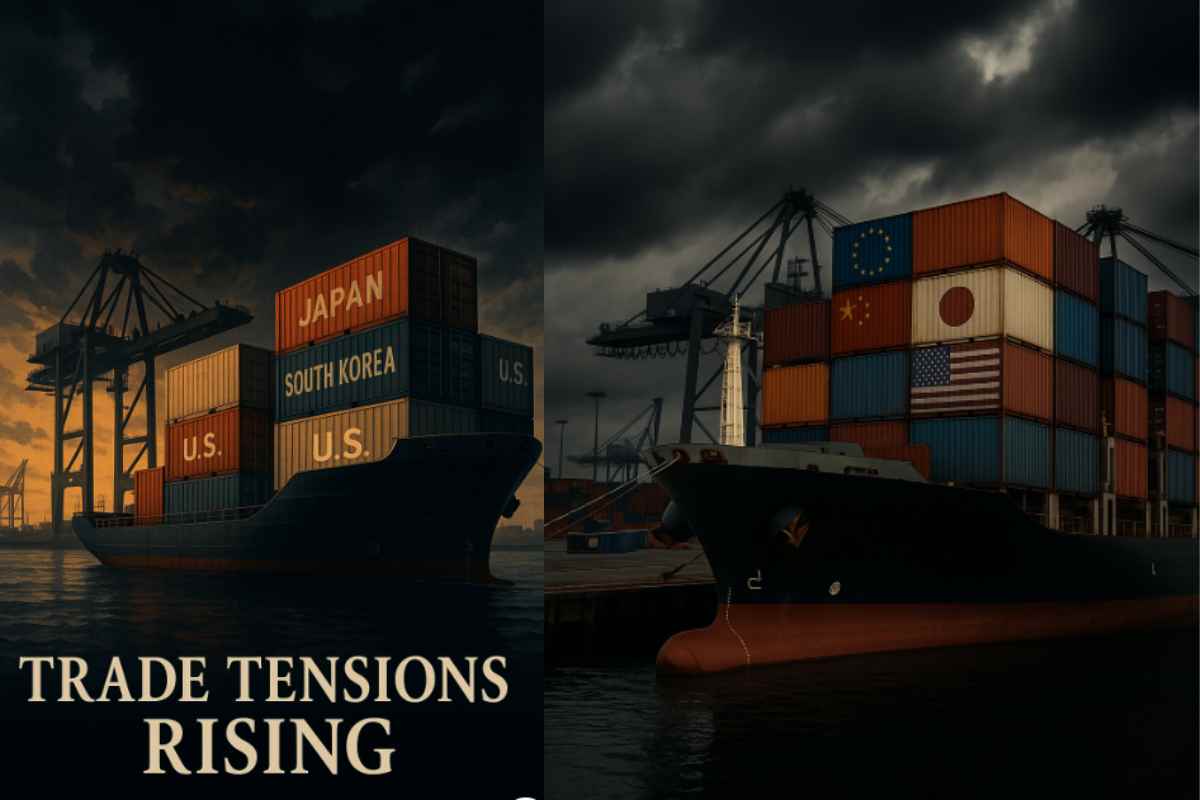Trump’s Jungle Trade Gamble: Why Deals Are Losing Their Power

Trump’s Jungle Trade Gamble: Why Deals Are Losing Their Power: For decades, American trade strategy relied on multilateral treaties and carefully negotiated agreements. Most deals included detailed rules, enforcement clauses, and gradual tariff reductions. Businesses and industries depended on this stability to plan global supply chains, investments, and hiring.
Under Trump’s leadership, this approach has changed dramatically. His trade team introduced steep tariff hikes—some rising to 25 per cent—against traditional partners. He argued that previous deals were harmful, causing job loss and massive trade deficits. Meanwhile, he started negotiating new deals under tight timetables—sometimes promising dozens of agreements in months—but with few concrete results.
This change has transformed U.S. trade policy into a more confrontational posture. Instead of cooperation, there’s unpredictable volatility. Instead of slow but steady negotiation, there are sudden threats and shifting deadlines. Trade advisors and economists warn this shift could hurt American businesses and global confidence.
Trump’s Tariff Tactics
Tariffs have quickly become Trump’s signature policy. What once averaged around 2 per cent has now jumped to more than 15 per cent. These tariffs—placed on steel, aluminium, cars, electronics, and agricultural products—function like immediate taxes, raising costs for U.S. importers and consumers.
Trump claims that these charges balance unfair trade, push industries to produce domestically, and force other countries to negotiate. His team recently issued a firm deadline. Trade officials have just a few weeks to finalize sweeping deals or face more tariffs. Only a handful of agreements have been made so far, with most still in early design stages.
Critics argue this is high‑risk. Factories depend on foreign parts; farmers sell their goods abroad; retailers rely on imports. Sudden costs could disrupt supply chains. If trading partners retaliate with their tariffs, exports could suffer. That means lost jobs, rising consumer prices, and slower growth.
The “Law of the Jungle” Warning
A leading trade expert recently called this approach the “law of the jungle.” That phrase brings to mind a world without rules—where the strongest seize power while weaker players fall behind. In normal trade deals, partners rely on contracts, dispute resolution, and consistent rules. But when policies swing wildly with political agendas, deals lose meaning.
Without credible legal mechanisms, agreements become just words on paper. Businesses cannot rely on commitments. Investing in factories overseas becomes riskier. Diplomatic friction grows when deals are threatened mid‑negotiation. All these effects weaken global partnerships and may stifle economic cooperation.
Diplomatic Fallout with Key Allies
Three major U.S. allies—Japan, South Korea, and the United Kingdom—have been directly affected. Japan and South Korea are among the United States’ top trading partners. Sharp tariffs on cars, steel, and tech products hit deep into their economies. Both nations responded with warnings and threatened retaliatory measures.
The U.K. signed a new trade deal, but pundits say it was more symbolic than substantive. Vietnam also joined an agreement, but other major countries remain undecided. China remains under heavy pressure; there is a broad framework in place, but no final deal yet.
Diplomats and business leaders warn that these moves risk long-term damage. Former trade officials say the U.S. is isolating itself from its allies, pushing them toward other global powers.
Domestic Impact on U.S. Businesses
American businesses are already feeling the impact. Companies using foreign-made machinery, electronics, or raw materials have seen sudden cost spikes. Many are passing these costs to consumers. Some have delayed equipment upgrades or postponed expansion plans.
Farmers fear they will lose overseas markets. Rising tariffs often trigger retaliation. China and Europe have signalled red flags against meat, grain, and other American exports. Small manufacturers are struggling to absorb the cost of materials—leading to layoffs or shutdowns.
Some businesses are adapting by sourcing more locally or shifting operations to friendlier countries. But that can be slow, expensive, and sometimes impossible. Many argue that stability—not unpredictability—is the proper driver of growth and job creation in trade‑based industries.
Political Strategy: Power or Risk?
Trump defends his approach, calling it “negotiation with strength.” He believes aggressive tactics are the only way to force better deals after years of perceived unfair treatment. He set a deadline: finalize dozens of agreements in just months or expect more tariffs.
Supporters view this as a bold plan to protect American workers and restore economic sovereignty. But even some Republican trade experts caution against making threats without follow-through. Delaying or rewriting deals could backfire.
Critics view it as brinkmanship without strategy. They say signing deal outlines without enforcement provisions is hollow. Adding tariffs without clear objectives may weaken U.S. influence and invite foreign retaliation.
Legal and Global Trade Implications
If the United States pulls out of WTO rules or undermines global norms, other countries may follow. That could spark a wave of protectionism, border taxes, and broken trade alliances worldwide. Courts and trade tribunals might block unilateral tariffs—but only after lengthy appeals.
If America repeatedly breaks or threatens established agreements, countries might start excluding the U.S. from new trade blocs. Some experts predict a shift toward regional or tech‑focused pacts that leave the U.S. sidelined.
This could fundamentally change global trade architecture. Cooperation could be replaced by competition. Trust, once broken, takes years to rebuild.
Looking Ahead: Stakes and Outcomes
What comes next? The U.S. has a deadline for new deals. Allies are observing. If significant agreements emerge, this bold stance might be validated. But a collapse in trade talks could mean widespread economic pain.
Congress may also react. Lawmakers from rural and industrial states could reject broken promises. Trade deals need approval. If the president delivers weak or empty deals, cooperation could fall apart politically.
Follow Us on LegalNewsUpdates Facebook Page for more updates
At home, consumers, farmers, and manufacturers are paying attention. A partial rebound in trade could improve business sentiment. A stall might drag down markets and investor confidence. Global partners may grow nervous about long-term relations.
Expert Voices: Analysis & Warnings
Policy experts are speaking out. They emphasize that strong trade depends on reliable rules—not threats: diplomatic ties and trust matter. If the U.S. abandons those principles, both partners and profits could shift elsewhere.
Supporters say America is tired of playing by old rules. They welcome a tough stance and believe it will yield better deals. But many economists caution: tariffs are blunt tools. They disrupt established systems and carry unintended consequences.
Summary & Final Thoughts: Trump’s Jungle Trade Gamble: Why Deals Are Losing Their Power
Trump’s new trade policy marks a significant shift. He is using tariffs as leverage and pushing for massive deal-making under tight deadlines. Critics call it “jungle law”—no structure, no guarantee, only threats.
Trade could improve—with better terms and more vigorous enforcement. But it could also collapse into confusion, with broken promises and global fallout.
Which path the U.S. takes will depend on upcoming deals, court rulings, and political persuasion. Whether this is a more innovative, fairer approach—or a dangerous gamble—will shape America’s economic future.







1 thought on “Trump’s Jungle Trade Gamble: Why Deals Are Losing Their Power”